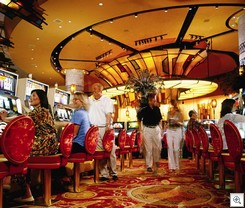 Modern gambling came to Connecticut swiftly and almost completely in 1971. A lottery, offtrack betting, and horse-track betting all became legal at the same time. In 1972, dog-racing and jai alai betting were legalized. Only casinos and sports betting remained, and efforts to bring about legalization started in the 1970s. Bills allowing a casino in the depressed community of Bridgeport were introduced in 1981. The measure died in a state legislative committee. Bills were also defeated in 1983 and 1984. The momentum for casinos seemed to die. But Connecticut permitted casino games for charities; they could hold Las Vegas Nights. Connecticut also had Native American tribes. The one organized reservation belonged to the Mashantucket Pequots. They started bingo games and then requested negotiations for casino gaming. After several court battles, the state negotiated to allow the tribe to offer casino table games. In 1992, the tribe asked for slot machines even though they were not permitted in other entities in the state. Without going through the negotiation process, the state agreed to allow the machines if the tribe would give the state 25 percent of the revenues from the machines. The National Indian Gaming Act prohibited state taxation of tribal gaming; therefore, the state and tribe called the “fee” a contribution exchanged for the right to have a monopoly over machine gaming in the state. When a second Native casino opened on a new reservation created by the Mohegans, the Pequots renegotiated the amount of money from the machines that they give the state. In 1999, nearly $300 million went to the state as a result of the agreement.
Modern gambling came to Connecticut swiftly and almost completely in 1971. A lottery, offtrack betting, and horse-track betting all became legal at the same time. In 1972, dog-racing and jai alai betting were legalized. Only casinos and sports betting remained, and efforts to bring about legalization started in the 1970s. Bills allowing a casino in the depressed community of Bridgeport were introduced in 1981. The measure died in a state legislative committee. Bills were also defeated in 1983 and 1984. The momentum for casinos seemed to die. But Connecticut permitted casino games for charities; they could hold Las Vegas Nights. Connecticut also had Native American tribes. The one organized reservation belonged to the Mashantucket Pequots. They started bingo games and then requested negotiations for casino gaming. After several court battles, the state negotiated to allow the tribe to offer casino table games. In 1992, the tribe asked for slot machines even though they were not permitted in other entities in the state. Without going through the negotiation process, the state agreed to allow the machines if the tribe would give the state 25 percent of the revenues from the machines. The National Indian Gaming Act prohibited state taxation of tribal gaming; therefore, the state and tribe called the “fee” a contribution exchanged for the right to have a monopoly over machine gaming in the state. When a second Native casino opened on a new reservation created by the Mohegans, the Pequots renegotiated the amount of money from the machines that they give the state. In 1999, nearly $300 million went to the state as a result of the agreement.
The Pequot casino, called Foxwoods, is located near the town of Ledyard. The casino is the largest in the world, with 284,000 square feet of gambling space, a bingo hall, 4,585 machines, and 312 tables. It produces gambling wins of approximately $1 billion a year. The Mohegan Sun casino is managed by Sun International, a company with gambling experience in South Africa and the Bahamas that had earlier acquired and later sold the Desert Inn Casino in Las Vegas. The casino, which is near Uncasville, has a gaming area of 150,000 square feet, 3,000 tables, and 180 tables.
<
|
|